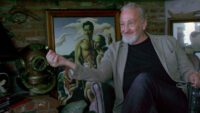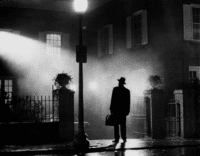It doesn’t take a film historian to notice that most westerns have an innate aimlessness to them which matches their period era. Words were chosen wisely and still minced to veil most showy emotion. The world was slower, where crowds were sparse and people sauntered more than sprinted. Yet, beyond all of that whistling and mozzying was also a harsher lifestyle more at peace with brutality when it arrived. For many, the main appeal of westerns is that very blend of idyllic breadth and carnal survivalism.
With that in mind, viewers will have to forgive just about every second act of every western movie in existence for its sluggish ambling. There’s a good chance it opened with a bang to get you going and will end with another to send you home satisfied. The challenge is to stay invested through the middle minutiae stuffed between the book-ending action. Know that it’s coming and prepare for it because Outlaw Johnny Black is one of those westerns.
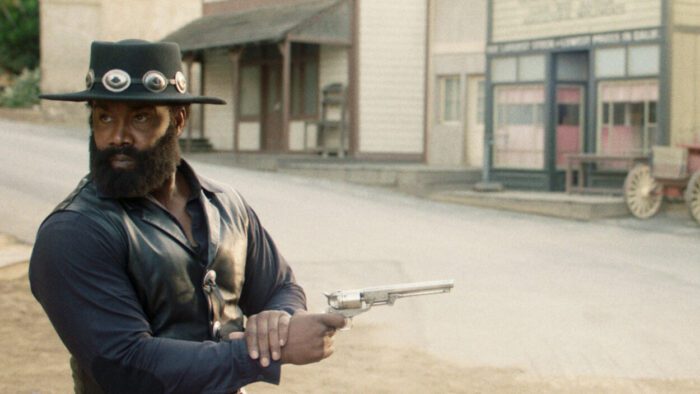
However, Outlaw Johnny Black is a special genre experiment that knows damn well what cookie cutter it’s using. Led by star Michael Jai White stepping into the director’s chair, these are the people that made the hilarious blaxploitation cult classic Black Dynamite 14 years ago. Yes! Go ahead and drop a Jules Winfield reply to that news. With a clenched fist and a tongue in its cheek, White and company are here to emulate and embellish the best and worst qualities of westerns by making a cool one of their own.
Sure enough, Outlaw Johnny Black opens with a stage-setting demonstration of the cool badassery it aspires to achieve. The title character (White) is a known wanted man seen entering a dusty town with determination on his face and Michael Bearden’s spicy musical score cutting the air. Trotting down the main drag, Johnny tips his hat, looks towards the undertaker milling about, and signals him with a number three, calling his shot and guaranteeing the man future business. The tough hombre dressed in black is looking for his eternally marked quarry of Brett Clayton (steady TV character actor Chris Browning), the gang leader who killed his trick-shooting preacher father Bullseye Black (Glynn Turman, in a nice extended cameo) many years ago when he was a kid (played in flashback by Till standout Jalyn Hall).
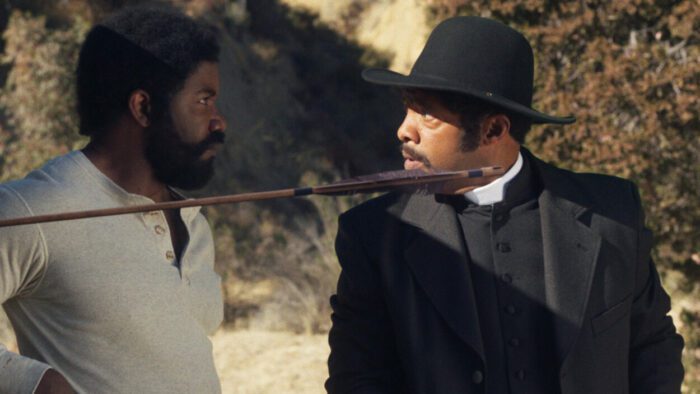
In true Michael Jai White fashion as a man with seven different black belts, Johnny uncorks sick (and intentionally inaccurate for its era) martial arts moves to dispatch many ruffians. He doesn’t get his man this time, but those three coffins find their new permanent occupants. After drawing more attention to himself from the local bounty hunter Bill Bassett (former UFC champ Randy Couture) and land baron Tom Sheally (the well-preserved silver fox Barry Bostwick)—including confrontations from (again, intentionally inaccurately depicted) Native American locals—Johnny has to continue his quest laying low in the country.
With high appreciation, Outlaw Johnny Black shows off an astounding dedication to practical action filmmaking. On the most immediate surfaces, the makeup department and the costume design work of Elizabeth Jett (Born a Champion) and Simone Lepthien (TV’s Beached) are first-rate for an independent production. Unlike today’s blockbusters relying on green screen backgrounds and plastered VFX, White and his second unit teams form this knock-down-drag-’em-out brawl with go-for-broke stunt work coordinated by Pete Antico (The Predator, Deadpool 2) and Terry Leonard (The Call of the Wild). Special honors are deserved for the nine-person horse wrangling team, which include four members of the Coulombe family who have worked on films like John Wick: Chapter 3 – Parabellum and Wonder Woman 1984.
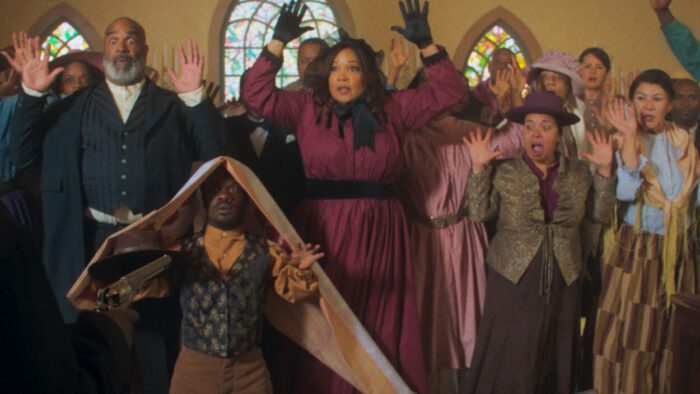
Throughout the opening third of the film, Michael Jai White is dialing up his own wheelhouse almost perfectly. Being 55 has not slowed or softened him a bit. White’s buff frame and deep vocal timbre intimidate most every screen partner, man or woman alike. When his character does fly off the handle, those eyes widen and the cheesy, agape exasperations call to mind those of a young Arnold Schwarzenegger. They earn as many laughs and they do cool points. Michael Jai White is best in this renegade hero mode. Sitting in the director’s chair for Outlaw Johnny Black, it’s when he deviates into plot-heavy backstory that his charismatic effect wears off slightly.
Out on the frontier, Johnny meets and befriends Reverend Percy (Black Dynamite co-writer/co-creator Byron Minns) on his way to become the new lead pastor for the area. After a skirmish appears to leave the good reverend dead, Johnny takes Reverend Percy’s personal effects and assumes his identity as a way to hop back into public undetected as he continues to track Brett Clayton and his whereabouts. Reverend Percy’s arrival is a trumpeted event of providence for the locals. This newfound quasi-celebrity status forces the normally uncouth Johnny to clean up his act, find fake-it-until-you-make-it religion again, and juggle two smitten sisters Jessie and Bessie (Anika Noni Rose of Jingle Jangle: A Christmas Journey and We Have a Ghost’s Erica Ash).
In aping the western genre with its tropes buffet, Outlaw Johnny Black still falls for the genre’s aforementioned trappings. The movie’s second act where Johnny Black is on the lam and playing Reverend Percy is a wearisome slog. That fatty middle of uneventful crossovers and the massaged message of finding forgiveness bloats the film’s runtime to 130 minutes when 90 or 100 would be plenty. Michael Jai White and any agitating rebel he plays needs to be dispensing painful justice more than mulling mini existential crises.
While the character evolution to lean on and bend stereotypes in Outlaw Johnny Black is admirable, that course saps the fun, satirical approach possible within Minns and White’s screenplay. Luckily, a reformed Johnny Black and his adversaries are not detaching themselves from their quarrel or six-shooters so easily. An inevitable climactic showdown (including some surprise cameos of memorable movie tough guys from yesteryear) arrives and all is forgiven. When this attempted romp and tribute is punching, kicking, and gunslinging, it doesn’t get much cooler.


